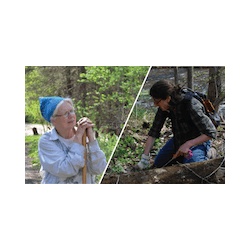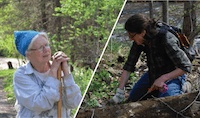
Two Decorah residents to receive statewide conservation award
Two Decorah residents will receive a statewide award for their extensive conservation efforts, including the removal of garlic mustard from area parks.
Beth Lynch and Mary Lewis will receive the 2015 Lawrence and Eula Hagie Heritage Award given by Iowa Natural Heritage Foundation. Lewis and Lynch will share a $1,000 prize and a hand-carved sculpture by Cedar Point artist Dennis Schlicht.
Lynch and Lewis are current and former Luther College biology instructors, respectively, and have dedicated their time inside and outside the classroom to many causes, including the removal of garlic mustard from Decorah parks.
Lynch first encountered garlic mustard while living in Dubuque, where she saw it spread rapidly and destroy parks. She later moved to Decorah and started seeing the invasive plant again but did not recognize the plant immediately: "It was just something green that I didn't recognize." Upon further investigation, she realized what it was.
"I love the woods. This plant is a great disruption to that. This needs to be something that people know about," Lewis said. She began to talk about garlic mustard to her students and the community in an attempt to organize groups to weed the forests.
"Some people think we're insane, but the community that is willing to pitch in and help is growing," Lynch said. Both women have been working to rid Decorah parks of garlic mustard since 2002. Both Lynch and Lewis lobbied Decorah Parks and Recreation to do more to stop garlic mustard from growing, organized groups to help pull the plant, and hosted education sessions on how anyone can identify and dispose of garlic mustard.
Lewis can often be seen in Decorah parks trying to eradicate the species. Lynch always carries some sort of informational pamphlet to hand out to people she sees in the parks. Both women have worked with INHF Blufflands Director Brian Fankhauser on garlic mustard removal events in and around Decorah.
"I don't consider myself to be an activist, but I have a strong sense of moral responsibility to the nonhuman world," Lynch said. "The community I work for is a broader community-the nonhuman community."
When asked about what still needs to be done, Lewis said that though "there are many places where we have eradicated it" there is still a long way to go. Lewis highlighted the need for ongoing maintenance of the land because even when garlic mustard is not flowering, its seeds can be spreading. It takes years after weeding to fully eradicate the seed banks in the ground.
"I think the most important thing that we've shown in Decorah is that if we start early and we don't give up, we can stop garlic mustard," Lynch said. However, "the biggest dream is that more and more people would be able to notice the world around them-the natural world-and to feel like they have some commitment to protect it."
Garlic mustard is an invasive species first seen in Decorah parks around 2001. The plant crowds out native species and changes the soil composition of the land. This makes it more difficult for tree seedlings to grow, which many animals and insects depend on for food and shelter.
Lynch and Lewis will receive their awards at a public ceremony in Decorah on Friday, November 13th.
Site designed and maintained by Iroc Web Design Services©.
Your Small Business Web Design Solutions.™


